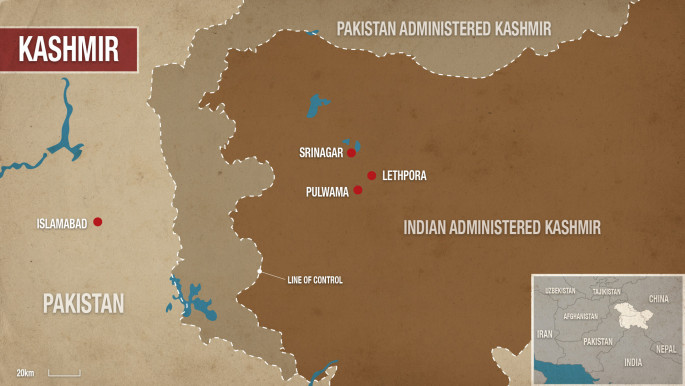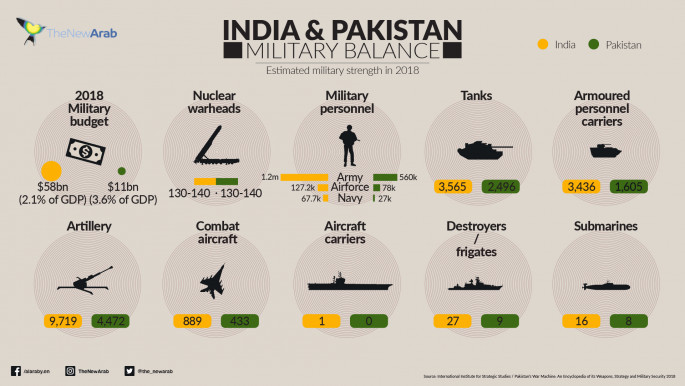
War averted. What now for Kashmir?
We are back to crass, self-interested politics in South Asia. What a relief. After a week on the brink of war between two nuclear-armed nations, political backbiting seems almost entertaining.
But the world cannot afford to go back to business-as-usual, ignoring the Kashmir issue that sparked this confrontation and three previous conflicts. The fact the two sides are back to artillery exchanges which have already caused more military and civilian casualties in the troubled enclave is ample evidence of that.
In both countries, the brief façade of unity in the face of the enemy splintered almost as soon as Pakistani Prime Minister Imran Khan announced he would release an Indian pilot captured when his jet was shot down on Wednesday.
"What's the big hurry?" Pakistani opposition senator Sherry Rehman, a former ambassador to the US, asked on the Senate floor on Friday, a few hours before the pilot crossed the border to India. The obvious answer was, to head off a war before things got out of control.
Across the border, internecine name-calling was once more in full voice as Indian politicians shifted their focus - and rhetoric - from Pakistan back to the upcoming election.
Indian Prime Minister Narendra Modi challenged the patriotism of those who questioned his tactics in the standoff.
"Sadly, a few political parties guided by Modi-hatred started hating India," he told a rally, referring to himself in the third person. "These are the same people whose statements are helping Pakistan. I want to ask them, 'Do you believe our armed forces, or do you want to support forces that want to incite terror in our lands?'"
Modi has yet to even respond to Imran Khan's suggestions of talks - or answer his phone calls.
We're also back to empty diplomatic posturing. That was epitomised by the announcement from Pakistan's Minister of Climate Change that he would file a complaint at the UN charging India with "eco-terrorism" for dropping bombs on a "forest reserve" and damaging the trees.
 |
| [Click to enlarge] |
In a further sign of business-as-usual, the tone on Twitter in South Asia shifted. After days of jingoism, the rallying cry of the Indian political opposition, #GoHomeModi, was trending. Across the digital border in Pakistan, #NobelPeacePrizeforImranKhan and #PakistanLeadsWithPeace were outperforming all else.
Both sides seemed to come out of the confrontation with a win. "If Wing Commander Abhinandan's return provides the space for diplomacy to take over, it is because it gives both countries the opportunity to signal a victory of sorts. Islamabad will project itself as having done the decent thing, and New Delhi is likely to claim that its tough stance compelled his return," wrote The Hindu of India.
 |
The challenge now is to ensure the two countries never again return to the brink. A big step toward that involves finding a solution on Kashmir |  |
Stepping back from the brink
The outcome could have been very different. India and Pakistan have fought three full-scale wars over Kashmir. Also important to keep in mind: India's military is four times larger than that of Pakistan, which means those nukes are always in the equation as a last line of defence.
Twitter Post
|
The challenge now is to ensure the two countries never again return to the brink. A big step towards that involves finding a solution on Kashmir. The February 14 suicide bombing which killed more than 40 Indian soldiers and sparked the confrontation was the deadliest attack of the 30-year Kashmiri insurgency.
India claimed the 22-year-old militant allegedly responsible was a member of Lashkar-e-Taiba (LeT), a Pakistan-based group that carried out the 2008 attacks in the Indian financial capital Mumbai which left at least 160 dead, as well as a laundry list of other atrocities.
New Delhi says LeT is a creation of Pakistan's powerful intelligence services and has demanded that the group be eliminated. Even if that happens, the Kashmir issue is not going to go away. The enclave has been split into Pakistani-administered and Indian-administered territories since the 1947 partition of British India created Pakistan.
Kashmir had a majority-Muslim population at the time but was ruled by a Hindu maharaja who opted to join the newly-formed Indian nation, prompting a Muslim uprising that led to the arrival of both Pakistani and Indian forces, which went to war. The UN-negotiated ceasefire line is today's "Line of Control" (LoC) dividing Kashmir.
There has been intermittent violence ever since. A full-blown Muslim insurgency that broke out in 1989 has claimed more than 47,000 lives. Both India and Pakistan have been accused of widespread human rights abuses in their respective enclaves. A 2018 report from the UN High Commission for Refugees found that violations in Indian-administered Kashmir since 2016 were "of a different caliber or magnitude" due to both the Pakistan-backed insurgents and India's brutal response.
Scores of Kashmiri civilians have been blinded by pellet guns used by Indian troops.
This is a conflict that is not going away on its own.
 |
With the militaries of both countries heading back to the barracks, the question is: Will the world lose interest? |  |
Outside 'intervention'
The Trump administration initially endorsed India's military strike on what New Delhi claimed was a LeT base in Pakistan, in response to the suicide bombing. But when things looked like they might get out of control, Washington apparently thought better of that. US Secretary of State Mike Pompeo told journalists he "spent a good deal of time" on the phone with Pakistani and Indian leaders "encouraging each country to not take any action that would escalate and create increased risk".
Foreign ministers of the Organization of Islamic Cooperation, who met over the weekend in Abu Dhabi, condemned Indian "terrorism" in Kashmir. The resolution was a slap in the face for India, whose foreign minister addressed the meeting the day before. Turkey, Qatar and Iran did not take part in the summit, and Pakistan's foreign minister boycotted the gathering due to the presence of India.
However, the final resolution read: "Jammu and Kashmir remained the core dispute between Pakistan and India" and "its resolution is indispensable for the dream for peace in South Asia".
With the militaries of both countries heading back to the barracks, the question is: Will the world lose interest?
"The UN and international community should try to avert a war between the two countries, but at the same time they must realise that the core issue is the non-resolution of the Jammu and Kashmir dispute," the president of Pakistan-administered Azad ("Free") Jammu and Kashmir, Sardar Masood Khan, told me in an interview at the height of the crisis.
"Our argument is that the Western countries have been custodians and promoters of human rights. It is their responsibility to look at Kashmir through the prism of human rights, self-determination and international humanitarian law and not through the prism of realpolitik or their economic interests tied with India."
Sadly, when it comes to world affairs, myopic self-interest usually trumps all. But in this case, there's a strong argument that it is in the myopic self-interest of every country to resolve the Kashmir issue. Experts say a South Asian nuclear exchange would produce a global nuclear winter that could ultimately kill upwards of two billion people worldwide.
Any other questions about self-interest?
Lawrence Pintak is an award-winning journalist and scholar who was the founding dean of the Edward R. Murrow College of Communication at Washington State University. A former CBS News Middle East correspondent, Pintak has covered dozens of wars, conflicts, coups, and revolutions on three continents. His latest book is America & Islam: Soundbites, Suicide Bombs and the Road to Donald Trump.
Follow him on Twitter: @LPintak






 Follow the Middle East's top stories in English at The New Arab on Google News
Follow the Middle East's top stories in English at The New Arab on Google News


